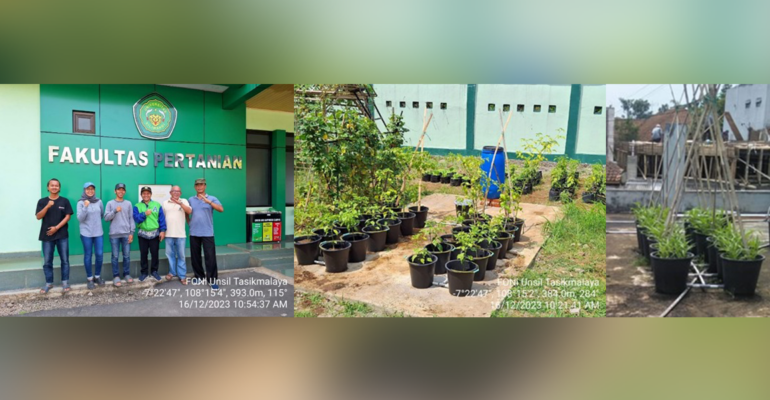IPB University Lecturers Apply Innovation for Tasikmalaya Community with Two Higher Education Partners

In the framework of the implementation of the Innovation Service Lecturer program in 2023, IPB University together with Sriwijaya University (Unsri) and Siliwangi University (Unsil) collaborated to disseminate the Nirdaya Automatic Fertigator (FONi) innovation in Tasikmalaya City. This program is a continuation of the 2022 Lecturer Pulang Kampung (DPK) program.
The head of the Innovation Service Lecturer team, Prof Budi Indra Setiawan said that FONi is an appropriate technology that can provide water and nutrients to each plant in a pot automatically. This technology has been registered with patent number P00202215852.
“The provision of water and nutrients is following actual plant water needs based on the principle of evapotranspirative irrigation. Thus, this technology can increase irrigation efficiency by close to 100 percent,” he explained.
He said FONi makes farming more comfortable for anyone, including beginners, it can be done anywhere in an open space that gets sunlight. Also, anyone can make FONi considering its simple construction and all materials are easily obtained.
“This dissemination is very useful for us. We understand how to plant practically and easily, without having to water the plants,” said Indra, one of the residents who participated in the activity.
“We also became excited to cultivate plants, both vegetables and fruits, because we heard firsthand the explanation from the Innovation Service Lecturer team who successfully planted with FONi and produced quite good crop production. Hopefully, we can fulfill our own vegetable needs in the household,” said Indra.
From this activity, Madrasah Al-Mashur and the local community managed to grow organic chilies, tomatoes, melons, and kale that have been picked several times. Meanwhile, Unsil planted various types of organic vegetables including mustard greens that have been harvested for the first time and are in great demand in the market.
Previously, Unsil planted them directly in polybags that were watered manually almost every morning and evening and faced weed problems. FONi can overcome these problems so that plants can thrive and the need for labor has dropped dramatically.
“I believe that FONi can produce sustainable organic vegetables, especially to meet consumer needs,” said one of Unsil’s lecturers, Ade Hilman.
Through this Innovation Lecturer program, several FONi units were installed at Madrasah Al-Manshur, Tasikmalaya. In addition, one FONi unit was also successfully installed in the Until Tasikmalaya campus field laboratory for education and development on various vegetable commodities.
Unsri lecturer Dr Riani Muharomah, who is also the inventor of the FONi patent, said that FONi has now been installed in several locations, including Malino Highlands, South Sulawesi, Purwokerto, East Java and Buru Island, Maluku.
Furthermore, the three universities agreed to expand the dissemination of FONi, in addition to adding FONi units at Unsil and Madrasah Al-Mashur, the local Agriculture Office will also be embraced to apply FONi in the gardens they manage and jointly introduce FONi to a wider community. (*/Rz) (IAAS/TNY)



